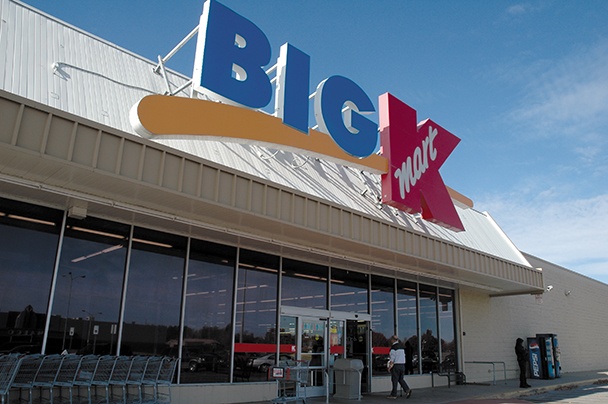Retail Report: Why Kmart is Struggling
by September 26, 2016 12:00 am 330 views

Sears and Kmart:
Why They Are Struggling
It’s no secret that both Sears and its sister chain Kmart have been struggling for a good long while. Earlier this year, Sears Holdings Corp. announced that it would be shutting down stores in both chains all over the country as a cost-cutting measure.
In fact, two Arkansas stores, including the Springdale Kmart location, are among the casualties and will be closing before the end of the year.
Analysts from Moody’s, after downgrading Sears’ liquidity rating, have predicted that the chains could shut down entirely.
According to a Business Insider story, Moody’s reported that: “The company is bleeding cash and will have to continue to rely on outside funding or the sale of assets, such as real estate, to sustain operations.”
Meanwhile, Sears Holdings issued its own statement rebutting these dire predictions, while Kmart recently announced the closing of 64 stores.
So the question is: Why is this happening to two of the country’s most enduring retailers?
According to another recent Business Insider article, the main problem seems to be one of creating a positive shopping experience for customers. Consumers complain that stores are poorly stocked, poorly maintained and poorly staffed.
In fact, lack of staffing appears to be a major issue, with multiple customers interviewed for the piece pointing out that they would go to a Sears store with cash in hand, hoping to make a purchase, only to walk out when nobody would help them actually buy the items that they had selected.
According to Business Insider, Gary Herndon, who says he is a 40-year veteran employee and longtime Kmart shopper, reported: “I have been in the store several times, and there is no presence of sales associates, only a cashier.
“If someone needed help with a tractor or mower, they would most likely walk out and go to Lowe’s, because the store was so inadequately staffed.”
One of Sears Holdings strengths is its real estate portfolio. Perhaps with the closure of stores and eventual sale of properties, Sears will be able to address staffing issues.
Walmart’s Self-Driving Carts
While self-driving cars remain in the testing phase, Walmart Stores Inc. has taken out a patent for a self-driving shopping cart.
There are no plans yet for the introduction of the carts, but the patent hints at a variety of benefits to both consumers and Walmart.
A recent CNN Wire article points to an excerpt from the patent request that says shoppers could request a cart using a “user interface device,” like a smartphone, and a detachable motor, equipped with sensors and video cameras, would bring the cart to the shopper.
In addition to not having to wrestle a cart out of a corral, store customers will be able to take advantage of the cart’s navigation abilities. Carts will be able to lead customers to items on their shopping list, alleviating the confusion that can often take place in big-box stores. In addition to assisting consumers, the carts can also manage tasks for Walmart itself.
For example, carts may be able to check inventory on store shelves, a task that could easily be accomplished during slow hours. Carts may also be able to drive themselves back to corrals, eliminating the need for an employee to gather and push them back to the store.
Since Walmart is placing greater emphasis on customer service as well as keeping prices low, carts that can complete tasks normally performed by store associates may prove to be a significant asset. Walmart will be able to manage staffing levels appropriately, while associates will be able to remain on the floor and at the registers.
Welspun Sheets and Consumer Trust
Supplier integrity is crucial to maintaining long-term relationships with retailers. Consumers, particularly millennials, are increasingly concerned about the integrity of consumer products. This means shoppers want to be able to trust package labeling and are willing to do some research to make sure that they are getting what they paid for.
India-based supplier Welspun recently received a huge amount of media attention after retailers began questioning its claim of selling sheets and towels made from 100 percent Egyptian cotton.
Welspun eventually admitted that it could not assure retailers that its packaging labels were correct. Reports also suggested that the deception had been going on for at least two years.
Repercussions were swift and severe. Target announced it was cutting all ties with Welspun, while Walmart Stores Inc. pulled the sheets from the shelves, offered purchasers full refunds and announced it would be working with Welspun to ensure product integrity. The supplier’s stock tanked, its executives had to scramble to save face via a massive internal audit and now consumers are filing a class-action lawsuit against the supplier.
Even worse, Indian industry leaders and business leaders worried that Welspun’s gaffe could hurt India’s developing export economy.
Reuters quoted an unnamed local analyst as saying: “This is another blot on the Indian exports resume. … The Welspun fiasco could have ripple effects and force companies to scout for options in other regions in Asia that have unscathed records.”
Why such a big deal over bedsheets? Cotton from Egypt is considered to be superior to that from other countries. The fibers are longer and can be woven into a more comfortable sheet. Chronically sleep-deprived Americans are particularly fond of Egyptian cotton and are less likely to purchase sheets that don’t sport the “Egyptian Cotton” label.
As Welspun continues damage control, suppliers and retailers have the opportunity to learn a critical lesson: Compliance is essential at all levels of business, including the back-end of sourcing and manufacturing. Savvy consumers won’t stand for being lied to — and neither will retailers who want to earn and keep the trust of their customers.
